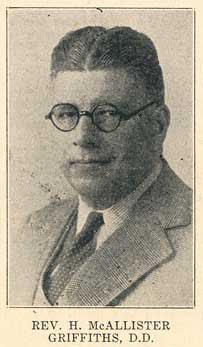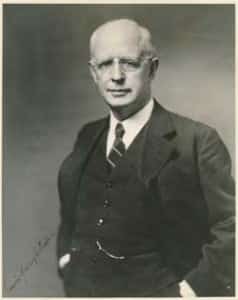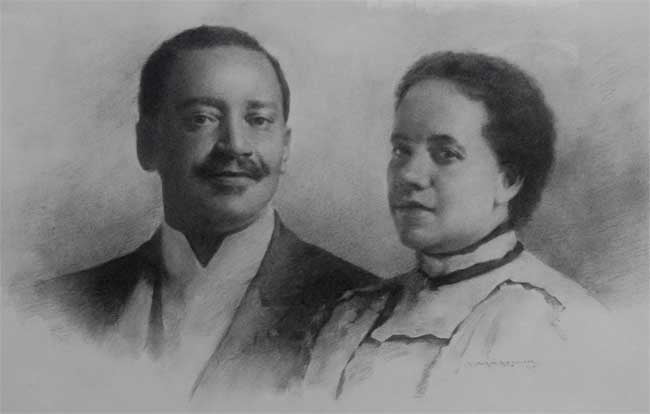Congo’s African-American Livingstone
Born March 8, 1865 in Waynesboro, Virginia, William Henry Sheppard, a black man, was never a slave. His mother was of mixed-race background, which status made him a free black. His father was an employee of the local all-white Presbyterian church, serving as janitor. Growing up, he was enrolled in the local school for blacks. Showing great resolve, he next enrolled at the Hampton Institute in 1880 in Hampton, Virginia, where Booker T. Washington was one of his instructors. Then graduating from Hampton in 1883, he moved on to the Tuscaloosa Theological Seminary (now Stillman College). After graduation in 1886, he became an ordained Presbyterian minister in the Presbyterian Church in the United States.
Dr. William H. & Lucy G. Sheppard.
Charcoal portrait by Greg MacNair, 2005. Used by permission.
[This portrait hangs just outside the reading room of the PCA Historical Center.]
Becoming a pastor at Zion Presbyterian Church in Atlanta, Georgia, Shepherd found himself restless and applied with the PCUS Mission board to go to the Congo as a missionary. When several applications received only vague rejections, Rev. Sheppard finally traveled to the headquarters and applied in person. Prejudices died hard in the former Confederacy, and this was evident by their initial refusal and final acceptance. He could go to the Congo as a foreign missionary, but only if a white missionary would supervise him. To his surprise, a young white minister by the name of Samuel Lapsley, volunteered to go with him in that position. They sailed to the Congo on February 25, 1890. Despite what the mission board stated at home, these two missionaries soon were treating each other as equals. Arriving at what is now the Democratic Republic of the Congo, they set about founding a mission in a village known as Luebo. Despite contracting malaria numerous times, Shepherd managed to adapt to the African climate and setting far better than did Lapsley, who died of a fever after only two years on the field, in 1892.
Of Lapsley’s death, Rev. Shepherd wrote,
Before this time you will have learned of the Mission’s loss. My friend and brother left Luebo, Jan. 6th, 1892, for the Lower Congo to attend to some business about the transport, and our land. He thought also a change would be beneficial to him, expected to return by the next steamer. I went forth with the people to do some building that our home might be more comfortable. For those two years we have labored as one. We have loved and cared for each other as though we were brothers. We have never been separated only this once, and it grieves my heart that I was so far from him. Oh! that I could have kneeled by his side to catch the last whisper before he slept. [The Missionary, 25.10 (Oct. 1902): 415].
Shepherd learned the language of the natives, which in turn enabled him to discover parts of the Congo where no outsiders had visited. He even found himself in a village of King Luckenga, which presence was in itself equivalent to a death sentence. However, Shepherd’s fluency in the language persuaded the king’s family that he was a reincarnation of one of their dead relatives.
In 1893, Sheppard left Africa to travel to London, England. He met Queen Victoria and was inducted into England’s Royal Geographic Society. Back in the United States, he lectured all over the States. Marrying Lucy Gantt, whom he had met just after he had graduated from the theological institute, they started a family. Expanding the first mission, they started a second Congo mission. When two of their children succumbed in disease, Lucy in 1898 took their third baby back to the United States, where they remained for two years.
In the next year, there was a new challenge. Shepherd began to notice the exploitation of the black tribes under the colonial ruler, Belgium, and specifically King Leopold II of Belgium. In essence, it was slavery in all of its terrible forms, with atrocities right and left. The Presbyterian Church had a spiritual interest in that part of the world, but it also was concerned with these human rights issues. In fact, it sent over a new white missionary to replace Lapsley by the name of William Morrison. Together these two missionaries brought that national colonial government to task, with pressure through the media.
Things were not well spiritually with Shepherd however. With his wife absent from him, he yielded to temptation on a moral plane with three adulterous relationships. Due to his fame worldwide, Shepherd was allowed to return quietly to the United States. Following a period of repentance and restoration, he and his family moved to Louisville, Kentucky, where for the next 27 years, William Shepherd served as pastor of Grace Presbyterian Church. He died on November 25, 1927 after a stroke.
Words to Live By: None of us is ever beyond temptation, and it may well be argued so much the more so for those greatly used of the Lord in His kingdom work. And so our Savior wisely said it for all time in Matthew 26:41 — “Watch and pray that you may not enter into temptation. The spirit indeed is willing, but the flesh is weak.” (ESV)
A final note, reflecting on Mrs. Sheppard’s role in the mission work. She wrote, in 1900 concerning the efforts at that time among the Bakuba people in the Congo:
Just now this people, the Bakuba, are experiencing some trouble. Very recently their king died, and while the people were in a state of mourning another tribe (we believe to have been sent by the State) invaded the capital, killed all of the royal family, and only one heir to the throne made his escape. these Bakuba are a very proud people, and while in a way they are glad for freedom (for their king was very exacting and cruel), they feel very keenly their loss, and feel that they have been very much degraded. They have known no other rule but that of a king for hundreds of years.
This king that had just died would allow neither missionary nor State officer to come to or near his place to settle, closed up all of the paths and prohibited a foreigner, or people working for foreigners, to pass near the place. Had he been less hostile, and showed a more friendly spirit, I’m sure this trouble would not have come upon this people. The king before him was very friendly, and was anxious that a mission should be opened at his place. But at that time the Committee felt that they could not see their way clear to have a work there. During his lifetime had the work been started, I believe all would have been calm and peaceful now. But it is not for us to see and know the future. Even now it is not too late to be of service. While many have been killed, there are thousands remaining. They feel helpless, lost, because their leader, their earthly king, is gone. But, oh, if some one would only come and tell them of the King of kings, and Lord of lords, who is a leader indeed!
[excerpted from a letter from Lucy G. Sheppard, dated 7 August 1900, Ibanj, Africa and published in The Missionary 33.12 (December 1900): 52.
For further study:
Primary sources:
William Henry Sheppard collection, 1971-1978, at Stillman College, Tuscaloosa, AL
Abstract: Materials consist mostly of biographical material on William Henry Sheppard, graduate of Tuscaloosa Institute and co-founder of the Presbyterian Congo Mission, and his wife, Lucy J. Gantt Sheppard. Also includes correspondence pertaining to the development of the Sheppard collection (1978), photos of the construction of Sheppard Library, correspondence and programs pertaining to the Sheppard Lecture Series (1971-1973), and list of materials in the college archives pertaining to Sheppard. Correspondents include A.R. Ware, Jr., Sheppard’s nephew, and Max W. Sheppard, Sheppard’s son.
William H. Sheppard papers, 1875-1933, 0.75 cubic feet (5 boxes), at the Presbyterian Historical Society, Philadelphia, PA.
Abstract: Collection consists primarily of photograph albums and photographs. Photographs document mission stations and churches at Luebo and Ibanche; the Sheppard family; other Presbyterian Church in the U.S. missionaries; and native people of the Bateke, Baluba, Bakuba, Zappo Zap, and other tribes. The collection includes a small number of papers, including correspondence; Sheppard’s reminiscences of his time at the Stillman Institute in Tuscaloosa, Alabama; a pamphlet entitled “How Sheppard Made His Way into Lukenga’s Kingdom”; printed materials about the Congo and King Leopold; hymnbooks in Tshiluba and an unidentified language; and glass and nitrate negatives.
See also reports of the African mission published in The Missionary [Richmond, VA: Whittet & Shepperson], vol. 23, no 2 (February 1890) and following. Copies of this periodical are available in the PCA Historical Center, St. Louis, MO.
Secondary sources:
• Kennedy, Pagan, Black Livingstone : A True Tale of Adventure in the Nineteenth-century Congo. New York: Viking, 2002. ISBN: 0670030368
• Phipps, William E., The Sheppards and Lapsley : Pioneer Presbyterians in the Congo. Louisville, KY: The Presbyterian Church (USA), 1991.
• Phipps, William E., William Sheppard : Congo’s African American Livingstone. Louisville, KY: Geneva Press, 2002. ISBN: 0664502032 (pbk.)
• Sheppard, William H. and S.H. Chester, Presbyterian Pioneers in Congo. Richmond, VA. : Published by Presbyterian Committee of Publication, 1917. Note(s): In 1890, the Southern Presbyterian Church appointed William Sheppard, an Afro-American from Waynesboro, Va., and Samuel N. Lapsley, a white man from Anniston, Ala., as missionary companions to the Belgian Congo. Rev. Lapsley died of a “bilious hematuric fever” on March 26, 1892. This is Sheppard’s account of the mission, both before and after Lapsley’s death.
[Reprinted as Pioneers in Congo : An Autobiography. Wilmore, Ky.: Wood Hills Books, 2006. ISBN: 097716361X]
See also:
Lapsley, James W., Life and Letters of Samuel Norvell Lapsley : Missionary to the Congo Valley, West Africa. [Anniston, Ala. : First Presbyterian Church], 1965.
Dissertations and Theses:
• Roth, Donald Franklin, “Grace Not Race” : Southern Negro Church Leaders, Black Identity, and Missions to West Africa, 1865-1919. Austin, TX: University of Texas at Austin, 1976. Masters Thesis, xv, 402 p.
• Dworkin, Ira, American Hearts : African American Writing on the Congo, 1890-1915. New York: City University of New York, 2003. Ph.D. dissertation, viii, 243 p. Includes the chapter, “In the country of my forefathers”: William Henry Sheppard and African American missionaries in the Congo.
• Short, Wallace V., William Henry Sheppard : Pioneer African-American Presbyterian Missionary, Human Rights Defender, and Collector of African Art, 1865-1927. Washington, D.C.: Howard University, 2006. Ph.D. dissertation, xxi, 544 p.
• Smith, Alonzo Nelson, The 1909 Trial of William H. Sheppard : Human Rights, International Diplomacy, and African American Concerns in the Belgian Congo. [Washington, DC : s.n.], 1996.
Also on this day:
Hayes T. Henry, director of the Pearson Mission to the Cherokee Indians, 1955-1968, and founding pastor of Christ Presbyterian Church, Tulsa, OK, was born on this day in 1912.



